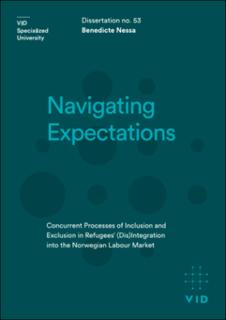| dc.description.abstract | The debates following the 2015-2016 refugee influx put the topic of immigration high on the political agenda and accentuated the issue as highly politicized. In a universal welfare state like the Norwegian, labour market participation is considered the leading indicator of successful integration. With the desire to reveal how such policy-led perspectives on integration are negotiated, this thesis explores refugees’ experiences settling in a society that combines a highly formalized labour market with high expectations of labour market participation. The study focuses on refugees' experiences during settlement, considering their aspirations of and actual labour market integration. In addition to focusing on the individual refugee, I explore the interaction between refugees settling in Norway and civil society organizations by investigating how civil society organizations offer support for refugees through integration processes. In the Norwegian context, the coinciding of neoliberal reforms and increased immigration has led to the development of policies aiming to make immigration cost-effective, giving increased attention to the voluntary sector as an important stakeholder in the integration processes. As such, studying the role of civil society organizations in the labour market integration of refugees is a case in point to explore how the volunteer sector navigates the increased expectations as welfare contributors in a modern welfare state influenced by neoliberal discourses and reforms.
The research design has a qualitative approach based on ethnographic fieldwork among refugees in three civil society organizations. The analysis draws on extensive participant observation and several semi-structured interviews with ten refugees and four employees in civil society organizations.
This thesis contributes to the field of migration research by portraying contemporary post-migratory narratives from a Norwegian context. Through the lens of refugees’ labour market integration, the three articles comprising this thesis, in different ways, highlight how the concurrence of exclusion and inclusion portrays the intertwined connection between processes of integration and disintegration. Article I discuss the different (subtle) forms and consequences of perceived discrimination as a specific and salient constraint influencing refugees' labour market aspirations. Based on these findings, I argue that the intersectional outcomes of labour market aspirations are connected to intersectional experiences of discrimination. Article II deals with the role of civil society organizations in the labour market integration of refugees considering how integration processes are experienced by the refugees in the study. The findings suggest a particularly vulnerable phase immediately after the public introduction program for refugees not moving on to employment, education, or training. Moreover, civil society organizations are highlighted as facilitators of arenas that are salient for capital acquisition. Article III delves into the entanglements of integration, belonging, and precarity. Taking gig economy employment as a case in point, the article discusses the refugees’ perceptions of how such a specific occupational context shapes their sense of belonging and integration. The findings suggest that structural and individual limitations in many ways condition the refugees to precarious work. Being relegated to precarious work at the bottom end of the labour market acts as an imaginary boundary line of exclusion, dichotomizing 'us' and 'them'. Based on these findings, I argue that their belonging is precarious: fragile and conditional.
Finally, the findings of this study speak to the broader discussion on how immigrationand integration issues pose an intriguing case to reflect on the social sustainability of the Norwegian society by accentuating its ability to transform itself due to the new circumstances. While the authorities’ perspective on the integration challenge is to increase the competence of the individual refugee, this thesis has shown that structural and contextual dimensions significantly impact refugees’ chances of inclusion or exclusion. On a deeper level, it reflects how structural and contextual dimensions should be considered when shaping a future socially sustainable society and welfare state.
Paper I: Nessa, B. (2024). Linking Labour Market Aspirations to Perceived Discrimination: the Case of Refugees in Norway. (Accepted to be published in Revue Européenne Migrations des Internationales, 2nd issue of 2024).
Paper II: Nessa, B. (2023). One Step Forward and Two Steps Back: The Role of Civil Society Organizations in Reversed Integration Processes among Refugees in Norway. Nordic Journal of Migration Research, 13 (3) DOI: https://doi.org/10.33134/njmr.580
Paper III: Nessa, B. Gig economy and precarious belonging: experiences of refugees navigating labour market integration in Norway. (Accepted to be published in Migration and Society). | en_US |
